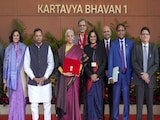Taliban has issued a statement saying the political crisis in Pakistan seeing a constant soar, will have no effect on Afghanistan. However, analysts predict an impact is inevitable on Afghanistan's situation due to changes in Pakistan's administration.
"The Islamic Emirate seeks good economic and political relations between the two countries", said the deputy spokesman of the Islamic Emirate, Inamullah Samangani.
"The current political crisis in Pakistan will not have any particular impact on relations between Afghanistan and Pakistan," he said in a further statement, reported TOLO News.
Meanwhile, political analysts claimed that there will be some impact on Afghanistan's situation as there will be a major change in the administration in Pakistan.
In a statement, Tahir Khan, a Pakistani journalist explained "There is a possibility that the consultation between the two sides will increase and maybe on how to bring good things in policy... when the new government is formed, it will announce its new policy but I don't see that there will be very much changed regarding Afghanistan."
"The political crisis in Pakistan will affect the economic relations of the people and government of Afghanistan," economist Hamid Aziz Mujadidi said.
Pakistan's Prime Minister Imran Khan was voted out of power on April 10 as he lost the vote of confidence in parliament mandated by the Supreme Court's ruling.
The result of the vote, which was the culmination of a 13-hour session that included repeated delays, was announced just before 0100 (2000 GMT on Saturday) by the presiding speaker of parliament's lower house, Ayaz Sadiq, read a statement by TOLO News.
Khan, 69 was ousted after 3-1/2 years of serving as Prime Minister of the nuclear-armed country of 220 million, where the military has ruled for nearly half its 75-year history.
Parliament will meet on Monday to elect a new prime minister, says TOLO News.
Opposition parties were able to secure 174 votes in the 342-member House in support of the no-confidence motion, National Assembly Deputy Speaker Sadiq said, making it a majority vote.
"Consequently the motion against Prime Minister Imran Khan has been passed," he said to the thumping of desks in the chamber. Khan, who was not present for the vote, had no immediate comment.
The house voted after the country's powerful army chief General Qamar Javed Bajwa met Khan, and stated two sources in a statement to TOLO News who spoke on condition of anonymity.
Shehbaz Sharif, the younger brother of three-time Prime Minister Nawaz Sharif and a front-runner to become Pakistan's next prime minister, said Khan's ouster was a chance for a new beginning.
"A new dawn has started... This alliance will rebuild Pakistan," articulated Sharif, 70, in parliament.
Parliamentary elections are not due until August 2023. However, the opposition has said it wants early elections, but only after it delivered a political defeat to Khan and passes legislation it says is required to ensure the next polls are free and fair.
Khan is the first to be removed through a no-confidence vote and his ouster extends Pakistan's unenviable record for political instability.
Opposition parties say he has failed to revive an economy battered by COVID-19 or fulfil promises to make Pakistan a corruption-free, prosperous nation respected on the world stage, says TOLO News.
Reema Omar, South Asia legal adviser to the International Commission of Jurists, also said it was an ignominious end to Khan's tenure. On Twitter, she posted, "3.5 years marked by incompetence; extreme censorship; assault on independent judges; political persecution; bitter polarisation and division; and finally, a brazen subversion of the Constitution."
Imran Khan rose to power in 2018 with the military's support but ultimately lost his parliamentary majority when his allies quit the coalition government. There were also signs he had lost the military's support, analysts claimed.
Imran Khan has become the first Prime Minister of Pakistan to lose the no-confidence vote in the National Assembly. Regardless of repeated attempts to dodge the no-confidence motion, the voting took place after midnight on Saturday, where 174 members voted in favour of the motion in the 342-membered house. Several members of the ruling Pakistan Tehreek-e-Insaaf(PTI) were absent.















